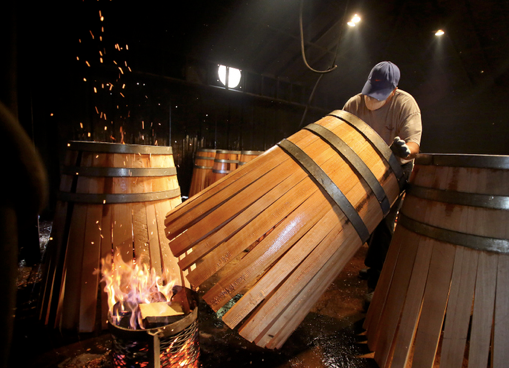
photo: kazzit.com
How is a Wine Barrel Made? 🍷
One of my hobbies is to recycle old wine barrels and make e.g. furniture from the wood and metal of the barrel. I also like drinking wine 😉, I like knowing where things come from, and how they are made. So I have done some research on how wine barrels are actually made.
Did you know that the flavour of wine is influenced by the type of wood used and the way and duration that a barrel is fired?
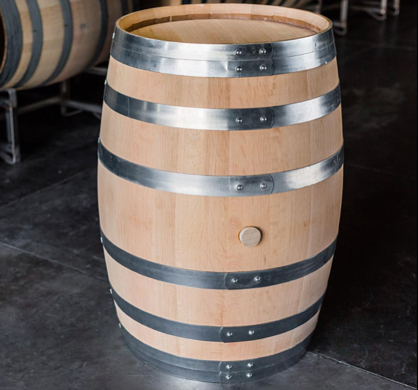
A finished wine barrel, photo: VinePair
The many wine barrels out there are all made by hand. A person that makes barrels is called a ‘Cooper’; that’s why there are quite a few people with the name “Cooper”. Coopers need incredible craftsmanship to be able to make these barrels.
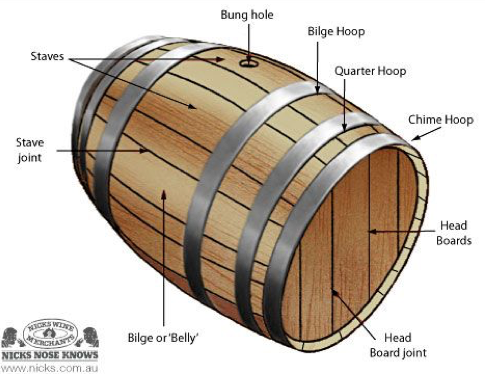
Main parts of a barrel, source: nicks.com.au
The main parts of a wine barrel are the staves, the hoops and the heads, see picture above. The 'bilge' is where the widest part of the barrel is, and the barrel has a "bung hole" where the wine can be accessed, which is often closed with a white silicone bung. There are a few other terms used, but for now that is enough to get to know the barrel making process.
Materials used
The key materials used for wine barrels are of course wood and metal. Wine barrels are generally made of oak, as this gives the wine a good flavour and it affects the colour, flavour, tannin profile and the texture of the wine. Barrels can be made out of French or American Oak. The hoops are made out of galvanized steel. An American barrel has 6 hoops, A French barrel has 8 hoops.
Making the staves
- Logs are cut to the desired length.
- The logs are split and cut into planks which will become staves; there is a variety of widths of the staves in a barrel, and almost every stave has a different width.
- The planks are air dried, this can take two to three years.
- The planks are then cut into the shape of staves, hollowed and tapered at the ends.
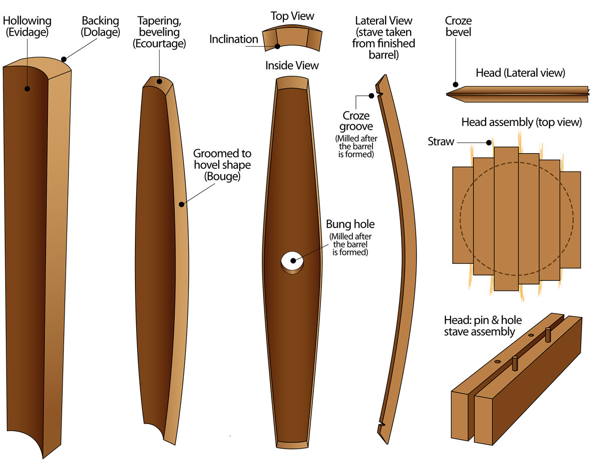
source: Wikepedia.com
Making the heads
- A series of planks is assembled with dowels to hold them together.
- A round piece is cut out of this assembly, which becomes the head.
- A router is used to shape the side of the heads so they can slot into the grooves of the staves later.
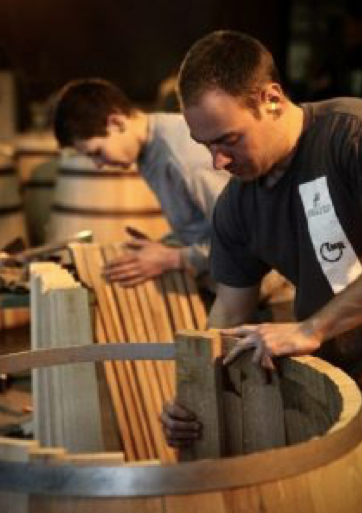
’mise en rose’, photo: Doreau
Putting the barrel together
- Some temporary hoops are now used for putting the barrel together.
- The staves are placed inside the temporary hoops at one end of the barrel, with 32 staves for a barrel. This process is called “mise en rose” in French, or literally translated as “put as a rose”. The barrel now looks like a (upside down) flower. This is a key part of barrel making, as the staves have to fit perfectly to ensure that the barrel will be water- (‘wine-’) tight.
- The hoops can now be lowered to tighten the barrel on one side.
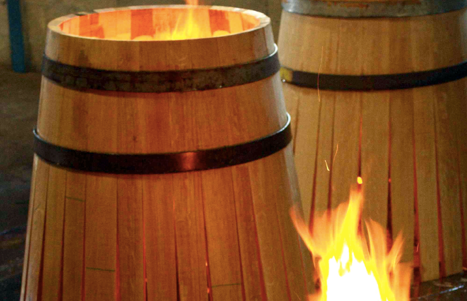
photo: Ngozi.com
4 - The wood is dampened on the outside and heated inside in order to be able to bend the wood.
5 - The barrel is then slowly tightened at the other end and closed with the hoops. This process can take hours to complete, as the wood needs to be bent slowly.

photo: silveroak.com
6 - The barrel is now left with a fire inside for a certain amount of time, which influences the flavour of the wine. This ‘toasting’ can be done at certain levels, e.g. light, medium, medium+ and heavy. A light toast takes around 40 minutes. French barrels are often not toasted.
7 - Now a groove is cut on the inside at each end of the barrel, so that the head can fit in this groove.
8 - The temporary hoops are taken off, to make room for the heads, which are placed on the barrel at each end.
9 - New shiny hoops will replace the temporary hoops.
There are many different sizes of barrels, ranging from 40 litre barrels to 700 litre barrels, often with different number of hoops. For wine, the most commonly used barrels are 225 or 300 litres.
My own creations
A I said, I like to recycle old wine barrels, and below are are some of my creations. One of my 'rules' is to only use materials from the barrels, apart from bolts and screws of course.
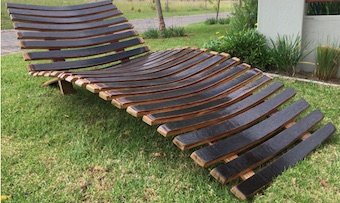
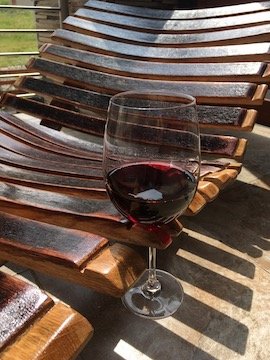

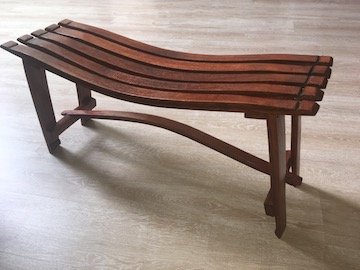

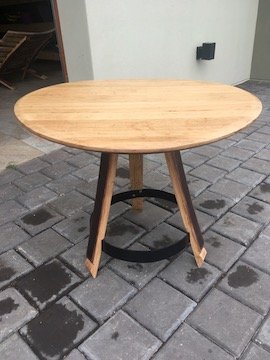
@Ultrabiker
Travel
Road less Travelled: Eritrea -- Somalia -- North korea -- Papua New Guinea (1) -- PNG (2)
Cycling
Global Cycling Network - Review
The toughest MTB races on earth Freedom Challenge -- Iditarod Trail Invitational
MTB back garden ride
Great Post!
Thank you very much, glad you liked it!
@trufflepig
Thanks for calling @ultrabiker! Here is a small upvote for this post and my opinion about it.
To my mind this post is at least 5 SBD worth and should receive 38 votes.
By the way, you can find TODAY'S TRUFFLE PICKS HERE.
I am
TrufflePig, an Artificial Intelligence Bot that helps minnows and content curators using Machine Learning. If you are curious how I evaluate content, you can find an explanation here!Have a nice day and sincerely yours,

TrufflePig